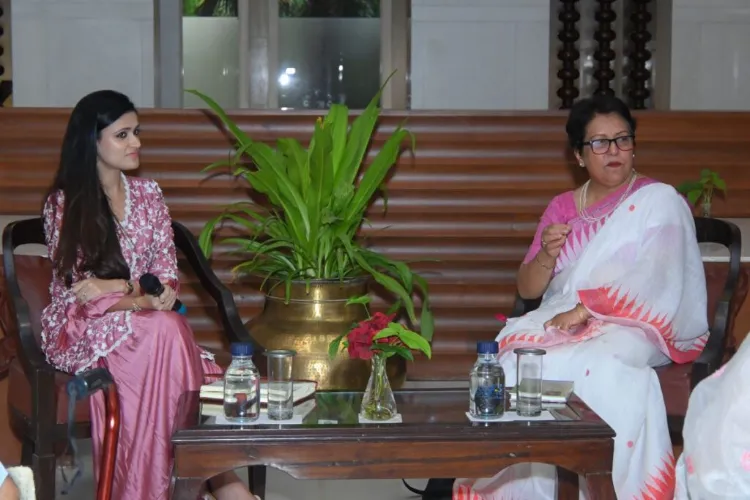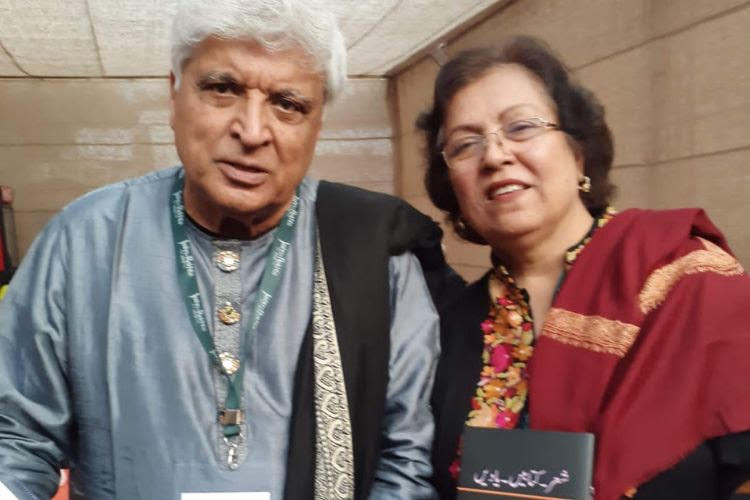.jpg)
Tripti Nath/New Delhi
Azra Naqvi, a distinguished Urdu poet and short story writer working with the Noida-based Rekhta Foundation, is truly a global citizen. Pickled in Urdu literature and community service at a very young age, Azra grew up determined to make a meaningful contribution to society.
Having lived in Mosul in Iraq and Riyadh in Saudi Arabia, Azra made the most of her husband’s postings in these countries and later Canada. Although she lived abroad for almost 30 years, her childhood memories of exemplary communal harmony of the late 50s, 60s, and 70s of her stay in India remain intact.
This Delhi-born poet has fond memories of her stay at the Jamia Milia campus and Shafique Memorial School in Bara Hindu Rao. “I remember my neighbour in Beriwala Bagh in Bara Hindu Rao in north Delhi where my Hindu neighbor Chand Behenji, from a refugee family, got along exceptionally well with my mother. Her daughters, Baby and Guggi were like-aged. I vividly remember dressing up and joining them for Kanya Pujan. We had a common door between our houses which always remained open.''
She says, “How I long to reconnect with them to relive the magic of those beautiful childhood days! Sometimes, these girls, out of sheer curiosity would peep in to see how my grandfather was offering Namaz. Because of my liberal upbringing, I continue to go to all places of worship. I have been to Tirupati and Bangla Sahib Gurdwara. At that time, my father was running a Balak Mata centre in Beriwala Bagh,” says Azra who lives in Greater Noida in Uttar Pradesh.
 Azra Naqvi during a media interview
Azra Naqvi during a media interview
At the age of 70, Azra is known for her literary accomplishments as a poet, writer, and translator.Not many would know that she has also done community service, worked as an announcer and disc jockey for the External Service Division (Urdu service) of All India Radio in the mid-70s, tried fund-raising and has also written columns in English for the Saudi Gazette and in Urdu for the Urdu News.
At present, Azra is busy working on a Hindi-Urdu-English online dictionary for the Rekhta Foundation.
Azra says it was her childhood in Aligarh that shaped her personality. “My father, Qaisar Naqvi was associated with Jamia Millia Islamia. Col Bashir Hussain Zaidi, who became the Vice Chancellor of Aligarh Muslim University after Independence, took my father to AMU where he began working as a Social Education Officer.
The family moved to Aligarh in 1957 and Azra studied at Abdullah Girls High School. She takes pride in having attended a school that was one of the first schools for Muslim girls in India. Later, it became women’s college and part of AMU. She has done her M.Phil in Adaptive Biology from JNU.
Her marriage to a Computer Scientist in 1976 in her mid-twenties took her to Iraq. After that, she joined her husband to Montreal in Canada in 1979 where he enrolled for a doctorate in Artificial Intelligence. She also learned the French language. Azra pursued a postgraduate diploma course in Education and taught in a kindergarten there.’
During her 12-year stay in Canada, she worked with like-minded women for the empowerment of South Asian women. Initially, they began with Indian women but soon realized that Pakistani women were facing similar problems. ‘’We started an association around 1980 called the South Asian Women Community Centre (SAWCC) We began with 20 women. The government was very supportive. We helped them learn English and French. I worked as a Coordinator there. Besides grooming the South Asian women and teaching them about cultural differences, we started workshops to teach them tax literacy. Gradually, we emerged as a centre where South Asian women could contact us for any kind of guidance. A couple of our co-founders from India and Pakistan are still keeping the organization going there.’’
Azra also joined a theatre group called Teesri Duniya which was started by a group of theatre enthusiasts. “Rana Bose (now no more) from West Bengal was the prime mover behind this theatre group. I remember having staged an Urdu play Woh Subah Kabhi To Aayegi by Zahida Zaidi who was a noted professor of English Literature at AMU. We then began staging skits based on the life there. Then, some French, Iranians, and Palestinians joined the group.
Azra says that Rahul Verma staged a play on the Bhopal Gas tragedy. Even now, they are staging plays on Palestine." We returned to India in 1989 for a year as my husband always wanted to teach in India. Somehow, it did not work out. So, we went back to Canada. He got a job offer from King Saud University in Riyadh where he worked.’’
 Azra Naqvi with Javed Akhtar
Azra Naqvi with Javed Akhtar
Azra recalls that she found some rules during their 15-year-long stay in Saudi Arabia stifling and irrational. “I got a chance to work in Sewa, a nursery for Indian children and a special care center for mentally challenged children for about four to five years.’’
Azra translated 'Voices of Change', a collection of short stories written by Saudi women writers in the 60s. “I was surprised that women were writing about their problems so frankly. I translated this book from English to Urdu and it was very well received. I got it published in 2008. The book was titled, Saudi kalmakaar aurton ki munthakhib kahaniyan. I also translated the English memoirs of Saudi journalist Ahmed Al Subai into Urdu. The book was titled My Days in Mecca. I also compiled my 15 short stories in Urdu Aangan jab pardes hua. Some of these stories document the cultural differences and plight of immigrants.’’
Azra is all praise for the founder of the Rekhta Foundation, Sanjiv Saraf. "He is a businessman but has created a lot of positivity through his passion for Urdu. He has a very competent team. I have been associated with the Rekhta Foundation for six years. My Hindi book Urdu Shabdon ka Guldasta was released at Jashn-e-Rekhta. It evoked a lot of interest. I wrote this book of 45 chapters during COVID-19 when everybody was homebound. I have explained the use of Urdu in everyday life. Last year, at Jashn-e-Rekhta, I compiled a selection of Urdu short stories and poems for children, in Hindi.’’
Azra has 11 Urdu books to her credit.
She strongly recopmmends that people learn to read and write Urdu. "It is very disheartening to see that even children of noted Urdu poets don’t know Urdu. State governments across India need to look into the pathetic state of Urdu schools. The new generation in Uttar Pradesh doesn’t know Urdu which is their mother tongue. ‘’
Narrating her experience as a child, she says, “My mother, Syeda Farhat had only studied till Class VIII but she surprised me with her impressive knowledge of world classics. She was a born poet. Her uncle, Dr Abid Hussain, a noted philosopher and one of the pioneers of Jamia Millia Islamia, often gave her books to read. She would write Nazm (poems) for children also. After Independence, she was the first Indian woman to publish her work in Urdu. I collected a lot of her unpublished works which I found at home and compiled them as Kulliyat e Syeda Farhat.''
The eldest of five siblings, Azra recalls that her mother would also teach children from underprivileged communities, free of cost.
On the future of Urdu, Azra says, “Baat yeh hai ki zubaan ko rozi roti se jodna zaruri hai.’’ (Urdu needs to be promoted to a level where its scope is expanded to create livelihood opportunities.) People need to be motivated to learn Urdu.’’
ALSO READ: Nazia Khan cures bodies with medicine and nurtures souls with her books
She says, “Jashn-e-Rekhta has promoted Urdu a great deal. Rekhta Books has done commendable work. They have ensured that the literary wealth and heritage of Urdu reaches non-Urdu speakers through books and audios-visuals.’’
